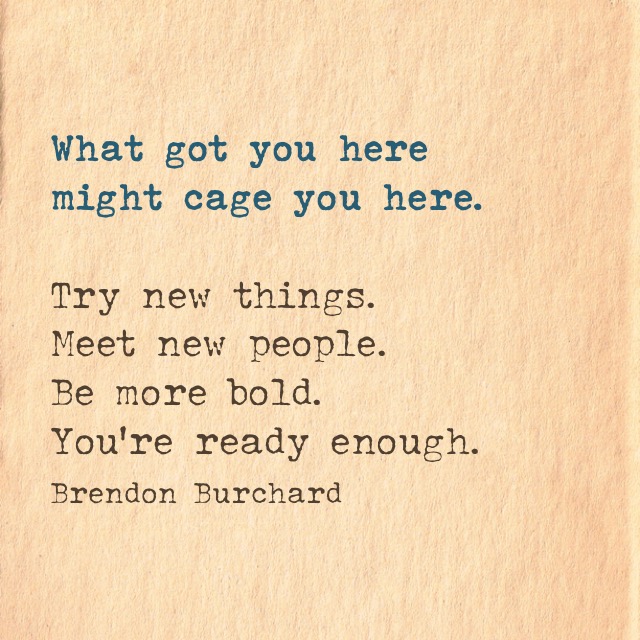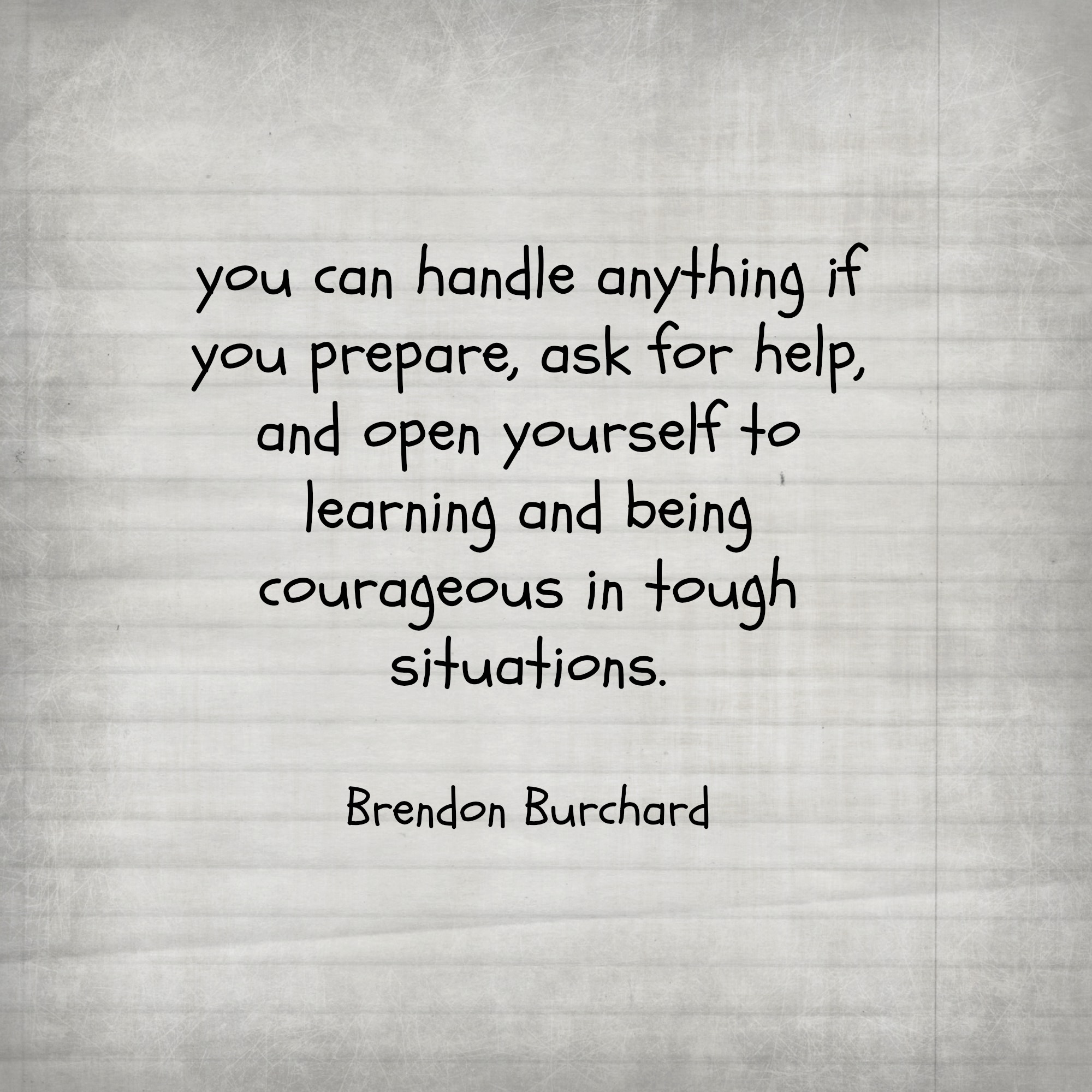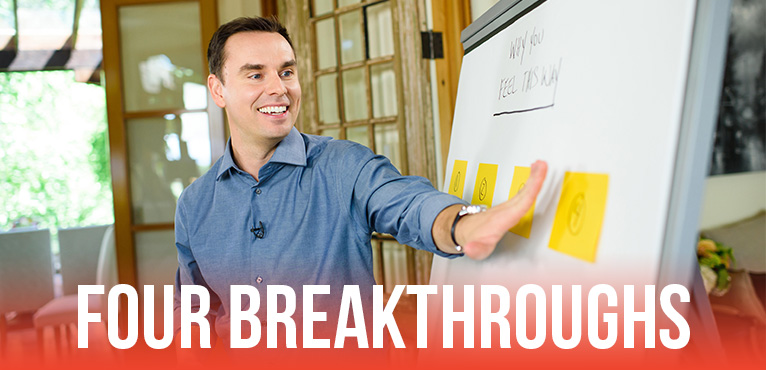Summary
How do choose which opportunities to chase?
Choosing between a bad opportunity and a good one is easy.
But choosing between two GOOD opportunities can be tough.
Next time, consider rating each of the following factors on a scale of 1-10 (one being bad, 10 being awesome), for each opportunity:
1. Return on Investment
2. Future Value
3. Personal Development
4. Lifestyle
5. Emotional Well-being
6. Social/Community
After rating on these categories on a scale of 1 to 10, and then adding them up, you will certainly find that one opportunity out-scores the other.
Watch the video above for the full lesson so that you can continue living #TheChargedLife!
Like this episode? Please share it! I can keep this blog and all my podcasts and videos ad-free and sponsor-free ONLY because you share my work! Please share or subscribe to my podcast andYouTube channel too!
Want more advanced training? Join my Success Accelerator.
Related quotes to consider:
[Follow Brendon on Instagram for tons of great quotes]

Transcript of “Opportunity Overwhelm” with Brendon Burchard
[The following is the full transcript of this episode of The Charged Life with Brendon Burchard. Please note this episode, like all TCL episodes, features Brendon speaking extemporaneously–he is unscripted. Filmed in one take, without any notes or prompter, The Charged Life has become one of the most viewed unscripted, direct-to-camera self-help series in the history of Youtube. It has also been the #1 Podcast in all of iTunes and is regularly in the top podcasts in Self-Help and Health categories around the globe. Subscribe to the free motivational podcast on iTunes or Stitcher.)
Transcript:
Have you been in a situation where you have so many things that you could do and you don’t know how to choose which one?
You’ve got lots of opportunities because you’re smart, you’re driven, you’re working hard. And today, there are so many opportunities or businesses you can start, franchises you can get involved in, things you can participate in online. You can be selling T-shirts online, you can be selling your voice online, you can be doing anything today, the opportunities are overwhelming and they are everywhere.
But it’s usually not a lack of opportunity for people because we can all make our own opportunities. It’s usually a decisiveness issue. Like I’m not sure what I really want here. I know I could do all those. It’s kind of like, if you ever went to college and you show up your first day in college and they’re like, “What’s your major going to be?”
And you’re like, “I just got here, dude.”
And they’re like, “Well, here’s a book of the 500 different majors you can have” and they’re like, “Of course, you should know it. You’re eighteen.”
And you’re like, “Dude, I don’t know.”
And it’s such a struggle. Well, I really believe that challenge only amplifies the older that we get. The older that we get, the more people know who you are, know what you’re skilled at, know what you’ve contributed in the past. Your resume gets a little bit longer, maybe. Your skillsets get a little bit deeper. And suddenly, there’s a lot of things you can do.
Which one, and which one first?
Those are difficult. What I would like to do today in this episode is talk about how to evaluate two different opportunities when both are good.
The easy decisions in life are right versus wrong. The tough decisions in life are right versus right–both opportunities could bring you benefit. Like you could do your cost analysis benefit. Draw that line—pros and cons. And you can see both opportunities are great and you can’t decide.
Well, let me give you a couple new areas to think about that might help you make that determination. I will give you 5 areas that come to the top of my mind every time I think about an opportunity. I’ve been doing this probably for 7 years personally; I have this sheet next to my computer and it’s got these 5 areas on them which I will give you. These are the areas that you would use to evaluate opportunities.
And what I do for each of my opportunities, let’s say, I would have one piece of paper here and one piece of paper there. On each of those I’d write these 5 categories but for each of them I’d give a rating of 1 to 10. So, 1 being not much there. 10 being absolutely. 10 is awesome. 1 sucks.
So, here’s how I do that. First, any time I’m evaluating an opportunity, someone is pitching me an idea, wants me to invest in them, wants me to do something with them, or brings me a project or a new potential client or some new thing I can go do with my life–I always look at this very first thing.
I think, “Okay, what would I have to put into this? And if I was going to get more out of it, What would it be?”
And here is the 5 measures I use to evaluate that:
The first one is: ROI (Return on Investment).
If someone wants me to participate in an opportunity, I think, “Okay, if I participate, if I give that my blood, sweat, tears, time, money, resources, emotional energy, will the return on all of that be significant in the next 12 months?”
That’s return on investment. Like, do I get my return on the investment fast?
1 would be a no,.10 would be absolutely. 1 is a no. 10 is absolutely.
So, I look at, first and foremost, the return on investment.
- Will there be one?
- Can I reasonably assume that there’d be a good return here?
1 out of 10. 1: no; 10: yes.
So, that’s my first evaluation of my two opportunities. Like opportunity A is good, opportunity B is good. How would I measure each on return on investment?
The second category I consider each of them and I give myself a scale of 1 to 10 is on future value. If I engage with this opportunity or this opportunity, how much would I get in future value from that? Not just an immediate return on investment but does that position me well in the future? A year from now. Two years from. Three years from now.
- Does the future value I get from that either emotionally or in terms of skills/training or true financial abundance?
- Does it help me achieve a specific goal later on?
- Does it put me in the right network of people later on?
That’s all future value. Can I see that? Or is this just a short term win?
See, a lot of people, because they are evaluating opportunities based on return on investment only, and they’re not thinking about future value, they’re usually making the wrong decision. They’re going for a short term win versus the long term gain. And so, combining those two will help.
So, return on investment gets a score of 1 to 10 in each of those opportunities and future value gets a scale of 1 to 10 in each of those opportunities.
You with me so far?
Now, the third category that I measure though is PD (Personal Development).
Engaging in this opportunity,
- Does it challenge me?
- Does it stretch me?
- Does it help me improve and forge a better character?
- Do I deepen my skillsets, my knowledge, my talents, my abilities?
In other words, do I develop a greater amount of competency and confidence in life because I went for this opportunity?
- Or is this opportunity just easy for me?
- Is this opportunity something that is way beyond?
- Is it going to be more?
- Is this way too challenging?
- Way outside my comfort zone?
These are things you should take into consideration. So, personal development is a rating that you give yourself. If opportunity A gives me more personal development then opportunity B and their equivalent on their return on investment and future value, I’m going to go with the one that’s going to be giving you more personal development. Makes sense?
That’s absolutely important to me. Really important to me.
- Am I going to grow from this?
- Am I going to master my craft from this?
- Is this going to help me truly?
Then, after I’ve considered personal development on a scale of 1 to 10 on each sides, now I consider another really important one lots of people don’t think about—Lifestyle.
Does this opportunity improve my lifestyle?
Because look, think about those top 3 measures. Okay, it could give a return on investment. Awesome. Lots of people say, “Yes”. It could be an absolute, amazing future value. Awesome. They go for it. It would stretch you, challenge you and grow. Awesome. They go for it.
Lifestyle, it destroys your life. You have to work at it 70 hours a week. You have no time off. You wreck your family. You wreck your relationships. You are miserable. You are exhausted. And your entire lifestyle is, get up, work like a cog in the machine, go to bed. That’s not a good opportunity.
Just because return on investment, future value and growth are there, you still need to consider life is short man. People always say, “Well, it was okay for me to give away a decade of my life to do something I hated and was miserable.”
I’m like, “No, no, no, because there is so many opportunities, you probably took your blinders, you needed to take your blinders off and realize, there’s lots of good things you could be doing. There’s no reason for any of us to slog through misery certainly not in the more developed countries. There is not abundance of opportunity everywhere in the world. We’re blessed.
If you are watching this video live and it’s streaming for you live, you’re pretty blessed, let me tell you what? Especially, if you’re doing it on the phone. That’s amazing. That a video, this long with this long winded guy could be still shouting at you on your phone. That’s unbelievable, yeah?
So, if that’s true that there’s; life is short and limited, make sure you care about your lifestyle because your lifestyle isn’t just yours. Your lifestyle affects:
- Your family
- Your spouse
- Your lover
- Your family; the kids.
I mean, people impacted by you and if your lifestyle is completely out of whack; all the time work, you know you’re some of the finer beautiful moments of life.
Is there one more category? I say there is and it’s really important too because all those other things could be really high but usually in one opportunity versus the other, this last one can help tip you in making that decision.
And that is: EW which stands for Emotional Well-Being.
You know, if doing this opportunity brings return on investment, future value, grows me, allows me the lifestyle that I love but it makes me insane because I got to deal with people I dislike all the time, I have to compromise on my integrity or my values. If I have to do something in a way that I’m just constantly always stressed emotionally in a horrible place.
- Even though I’m growing
- Even though I’m making money in the future
- Even though my lifestyle is decent
But you know what? I know a lot of people multi-millionaires who are miserable because they didn’t take the opportunity that made them feel fulfilled because they weren’t doing things that made them have a sense of meaning and purpose behind it. They took the return on investment, the future value, their growth and a beautiful lifestyle at the cost of their integrity, satisfaction, flow and fulfillment in life. That’s emotional well-being.
So, I think you get the point. You got 5 different categories. Each of those categories can be a scale of 1 to 10.
- A scale of no return on investment all the way up to lots of return on investment.
- No future value, lots.
- No growth, lots of growth.
- No lifestyle, lots of lifestyle.
- No emotional well-being, lots of emotional well-being.
That’s 5 categories, 10 points each. That means each opportunity, you can devaluate; gives you a total of 50 possible points. Well, what I always see one of them always wins. They are never ever equal unless I’m fooling myself. Look, across 50 different point possibilities, 10 different ratings for each of those 5 categories, one of them is going to win when you’re evaluating opportunities.
And once it wins, there is one other thing you have to take into account, one other thing and that is, “How does which ever one you choose impact the community around you?”
Meaning:
- Impact your family.
- Your friends.
- Those who are closest to you.
Does it impact them in a positive way or a negative way?
There is a social component to everything we do that we should always consider. There is lots of decisions we can make that would destroy the environment. There is lots of decisions that we can make that would lead us to destroying other people’s lives.
That’s not cool. We have to decide what not only makes a difference and is good for us but what makes a difference and is good for others as well. Once you’ve done that work of deciding between those two opportunities, now, it’s about not getting overwhelmed when you jump into the opportunity. When you jump into the opportunity don’t forget the things we spoke about.
- Lifestyle
- Emotional well-being
You need to bring in the energy that you want to in that opportunity. You need to make sure you set boundaries so you can have a life in that opportunity. And you need to make sure that you always know where are you marching? What is that thing that is meaningful and fulfilling to you so that you continue to say no to other side projects to stay on path?
I hope that that conversation served you in your opportunity evaluation today. Look, opportunity to overwhelm will always be there until you have your own criteria of:
- How to say yes.
- How to say no.
And you make that decision to stay on path. Make that decision to stay on path more often, you will get to experience what we call, The Charged Life.

